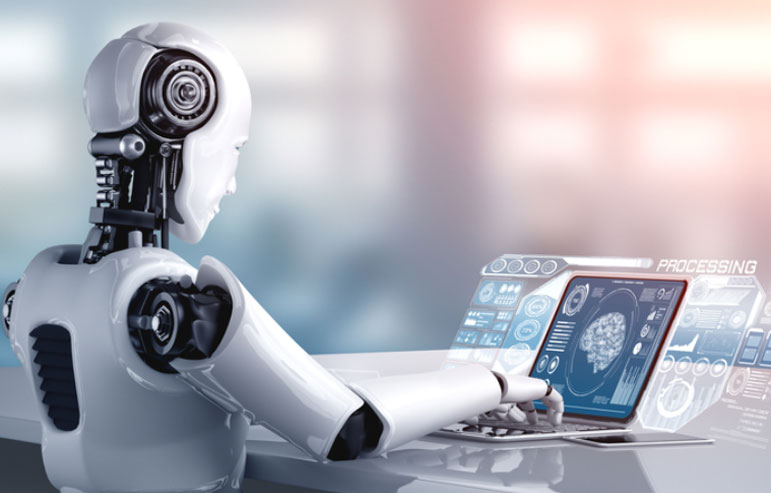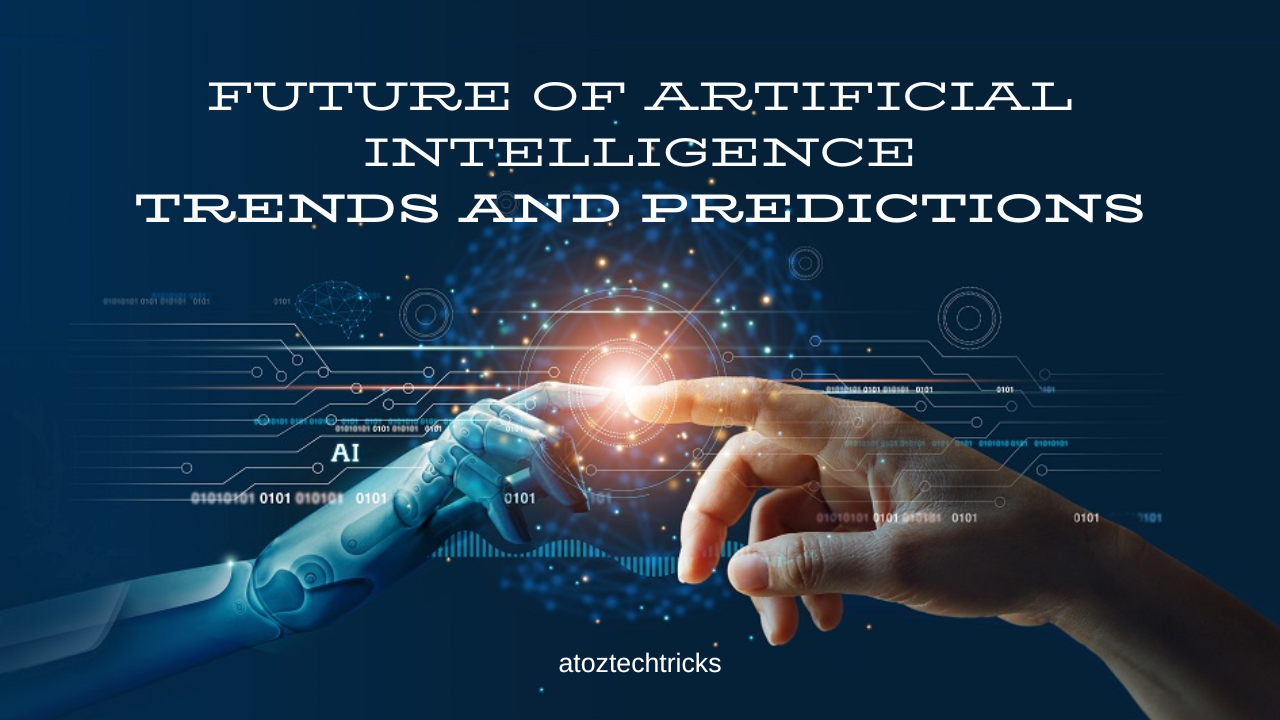Artificial Intelligence (AI) is evolving at a rapid pace, transforming various sectors from healthcare to finance, and beyond. As we venture further into the 21st century, AI is expected to become even more integrated into our daily lives and industries. This article explores the future of AI by examining current trends and offering predictions about where this transformative technology is headed.
1. The Current State of AI
AI has made significant strides over the past few decades. Early AI systems were based on rule-based algorithms that could only perform specific, pre-defined tasks. Today, AI encompasses a broad range of technologies including machine learning, deep learning, natural language processing (NLP), and robotics.
Machine learning, a subset of AI, involves training algorithms to learn from and make predictions based on data. Deep learning, a further subset of machine learning, uses neural networks with many layers to analyze complex patterns. NLP allows machines to understand and respond to human language, while robotics involves the design and application of robots.
Recent advancements include AI’s application in various domains such as healthcare (e.g., diagnostic tools), finance (e.g., fraud detection), and consumer services (e.g., chatbots and recommendation systems). These applications showcase AI’s potential to enhance efficiency, accuracy, and user experience.

2. Emerging Trends in AI
a. Explainable AI (XAI)
One of the significant challenges with AI, particularly in deep learning, is its “black box” nature—meaning the decision-making process is often opaque to users. Explainable AI (XAI) aims to make AI systems more transparent and understandable. Researchers are developing methods to interpret AI decisions and ensure that they align with human values and ethics. XAI is crucial for applications in sectors like finance and healthcare, where understanding AI decisions is essential for trust and accountability.
b. AI and Edge Computing
Edge computing refers to processing data near the source of data generation rather than relying on centralized cloud servers. This trend is gaining traction as it can significantly reduce latency and bandwidth usage. AI is increasingly being integrated with edge computing to enable real-time data processing and decision-making. This combination is particularly valuable in areas like autonomous vehicles, where immediate responses are critical.
c. AI in Personalization
Personalization has become a key focus for businesses aiming to enhance user experience. AI-driven personalization leverages data to tailor products, services, and content to individual preferences. This trend is evident in platforms like Netflix and Amazon, where recommendations are powered by AI algorithms analyzing user behaviour and preferences. The future will likely see even more sophisticated personalization techniques, driven by advancements in AI and data analytics.
d. AI and Augmented Reality (AR)
The integration of AI with AR technology is creating new opportunities for immersive experiences. AI can enhance AR applications by providing real-time object recognition, context-aware interactions, and personalized content. This trend is evident in industries such as retail, where AR applications allow customers to visualize products in their own space before making a purchase. The combination of AI and AR promises to revolutionize how we interact with digital content and the physical world.
e. AI Ethics and Regulation
As AI becomes more prevalent, ethical considerations and regulatory frameworks are becoming increasingly important. Issues such as data privacy, algorithmic bias, and the impact of AI on employment are gaining attention. Governments and organizations are working to develop guidelines and regulations to address these challenges. Ensuring that AI systems are used responsibly and ethically will be crucial for maintaining public trust and ensuring positive societal impact.

3. Predictions for the Future of AI
a. Greater Human-AI Collaboration
The future will likely see an increase in collaborative efforts between humans and AI systems. Rather than replacing human workers, AI is expected to augment human capabilities, allowing people to focus on more complex and creative tasks. For example, in fields like medicine, AI can assist doctors in diagnosing diseases and suggesting treatment plans, but human judgment and empathy will remain critical.
b. Advancements in General AI
While current AI systems are specialized and designed for specific tasks, researchers are working towards developing Artificial General Intelligence (AGI)—AI systems with general cognitive abilities similar to humans. AGI would have the capability to understand, learn, and apply knowledge across a wide range of tasks. Although AGI is still a long way off, significant progress in this area could fundamentally change how we interact with technology and solve complex problems.
c. AI-Driven Innovation in Healthcare
AI is poised to revolutionize healthcare by improving diagnostics, personalizing treatment, and accelerating drug discovery. Predictive analytics can identify potential health risks before they become serious, while AI-powered tools can assist in developing new therapies and medications. The integration of AI with genomics and personalized medicine will enable more tailored and effective treatments, ultimately improving patient outcomes.
d. Evolution of AI-Powered Autonomous Systems
Autonomous systems, such as self-driving cars and drones, are expected to become more advanced and widespread. AI will play a crucial role in improving the safety, efficiency, and reliability of these systems. Innovations in sensors, machine learning algorithms, and real-time data processing will contribute to the development of fully autonomous vehicles and other robotic systems that can perform tasks with minimal human intervention.
e. Impact on Employment and Skills
AI’s impact on the job market is a topic of ongoing debate. While AI may automate certain tasks and roles, it is also expected to create new opportunities and demand for specialized skills. The future workforce will need to adapt to these changes by acquiring new skills and embracing lifelong learning. Educational institutions and organizations will play a key role in preparing individuals for the evolving job market.
f. Enhanced AI Security and Privacy
As AI becomes more integrated into our lives, ensuring the security and privacy of AI systems will be paramount. Advances in AI security will focus on protecting systems from cyberattacks, ensuring data privacy, and mitigating potential risks associated with AI deployment. The development of robust security measures and privacy-preserving technologies will be essential for maintaining trust in AI systems.
g. AI in Creativity and Content Generation
AI’s role in creative industries is expanding, with applications in art, music, and literature. AI-generated content can enhance creativity by providing new ideas and perspectives. Future developments in this area may lead to AI systems that collaborate with humans to produce innovative and unique works of art. The potential for AI to inspire and augment human creativity presents exciting possibilities for the future of content creation.

4. Challenges and Considerations
While the future of AI holds great promise, several challenges must be addressed to ensure its positive impact on society.
a. Ethical and Social Implications
AI systems must be developed and deployed with careful consideration of ethical and social implications. Ensuring that AI algorithms are fair, unbiased, and transparent is crucial for avoiding discrimination and promoting social justice. Ethical guidelines and regulations will play a key role in addressing these concerns and ensuring that AI technologies are used responsibly.
b. Data Privacy and Security
AI systems often rely on large amounts of data to function effectively. Ensuring the privacy and security of this data is essential for protecting individuals’ rights and preventing misuse. Advances in data protection technologies and privacy-preserving techniques will be necessary to safeguard sensitive information and maintain public trust.
c. AI’s Impact on Society
The widespread adoption of AI has the potential to impact various aspects of society, including employment, education, and social interactions. Addressing potential disruptions and ensuring that the benefits of AI are distributed equitably will be important for fostering a positive and inclusive future.
d. Technological and Regulatory Challenges
The rapid pace of AI development presents challenges for regulatory frameworks and technological infrastructure. Keeping pace with technological advancements while developing effective regulations and standards will be crucial for ensuring the safe and responsible use of AI.

The future of Artificial Intelligence is filled with potential and possibilities. As AI continues to evolve, it will reshape industries, enhance human capabilities, and create new opportunities for innovation. While challenges and considerations must be addressed, the advancements in AI hold promise for improving various aspects of our lives and driving progress in numerous fields.
By staying informed about emerging trends and participating in discussions about the ethical and societal implications of AI, we can contribute to shaping a future where AI benefits all of humanity. Embracing the opportunities presented by AI while addressing the associated challenges will be key to unlocking its full potential and ensuring a positive and inclusive future.
Mobile Gaming Mastery: How to Get the Most Out of Your Smartphone Games



